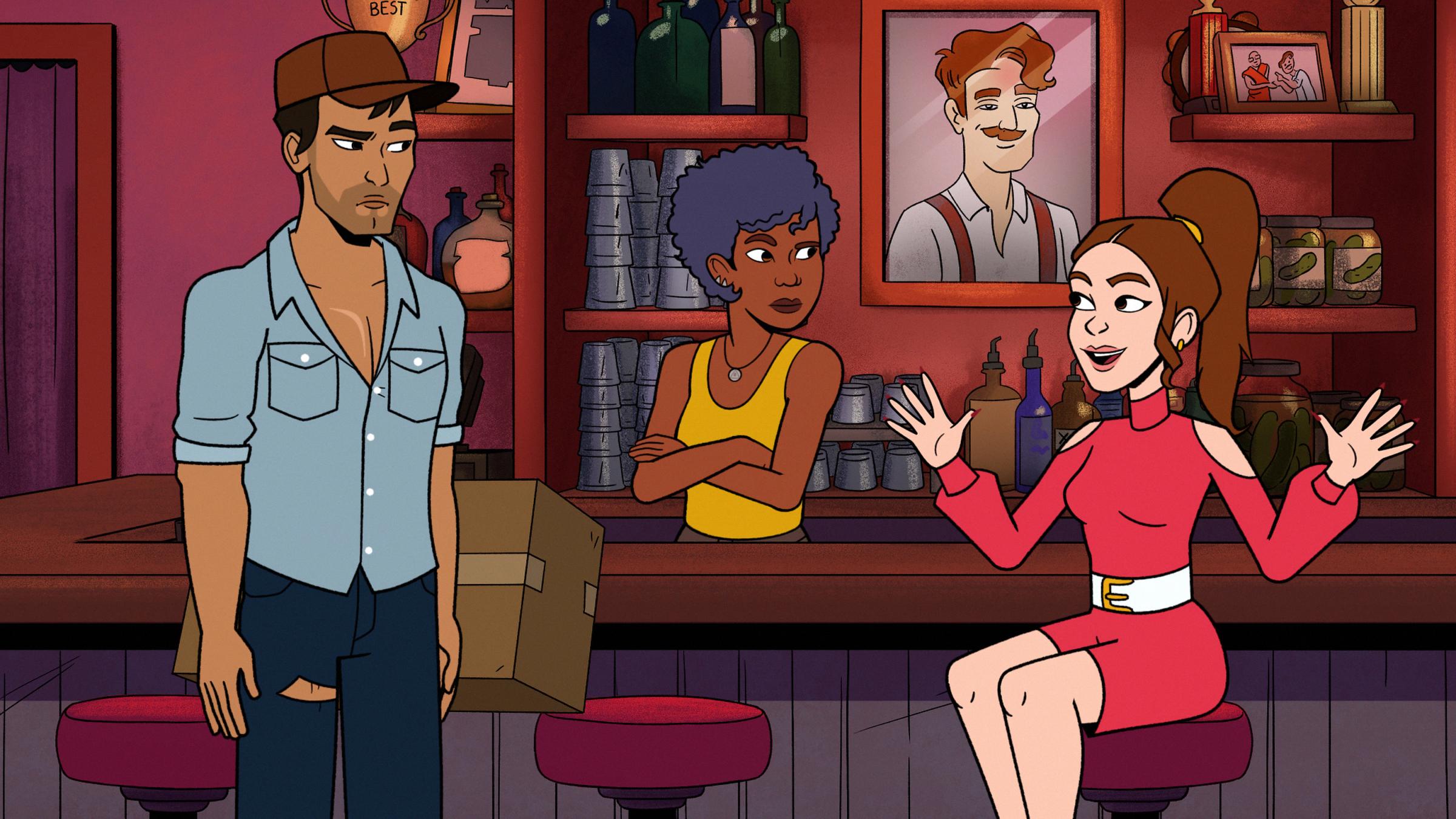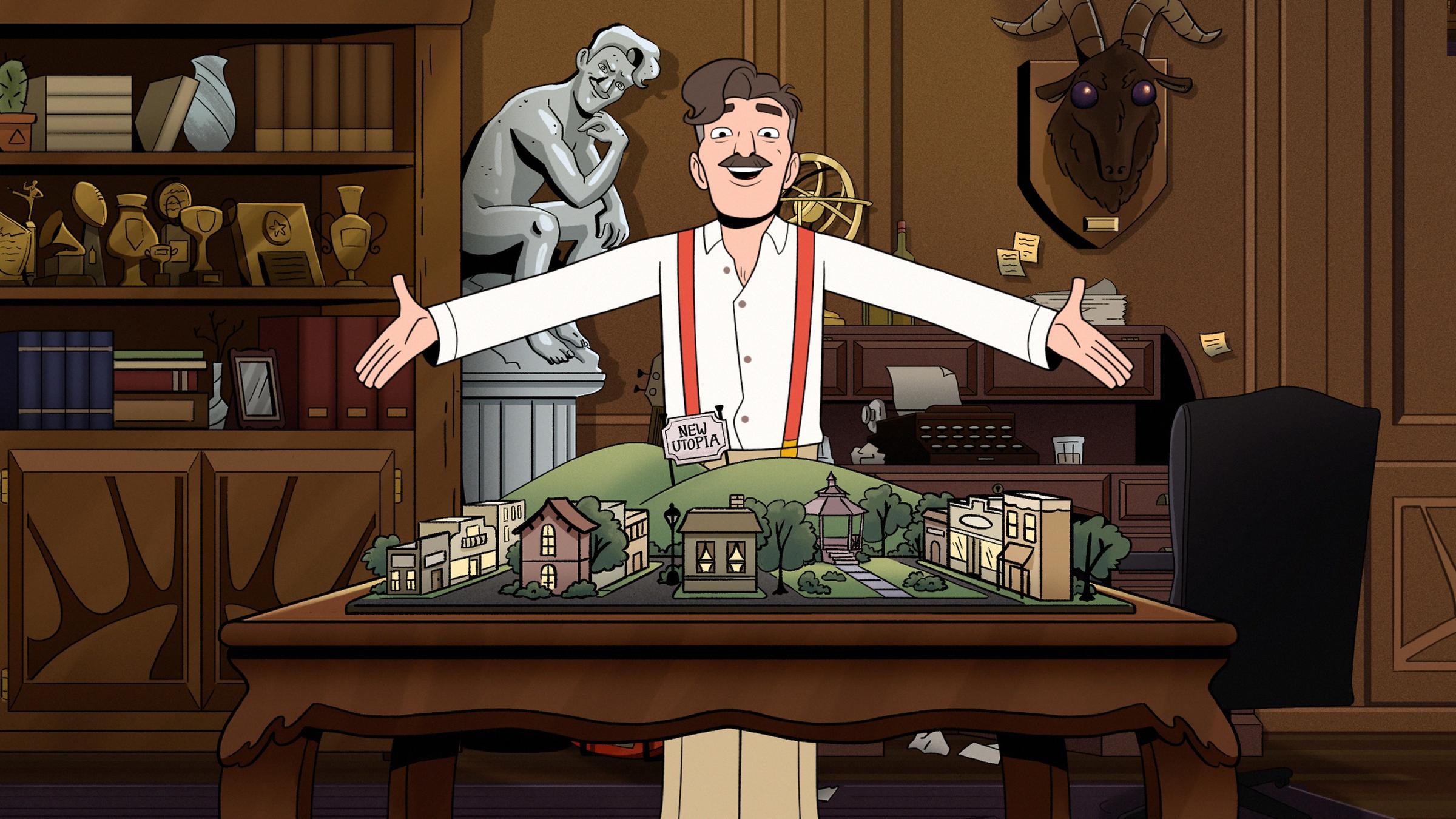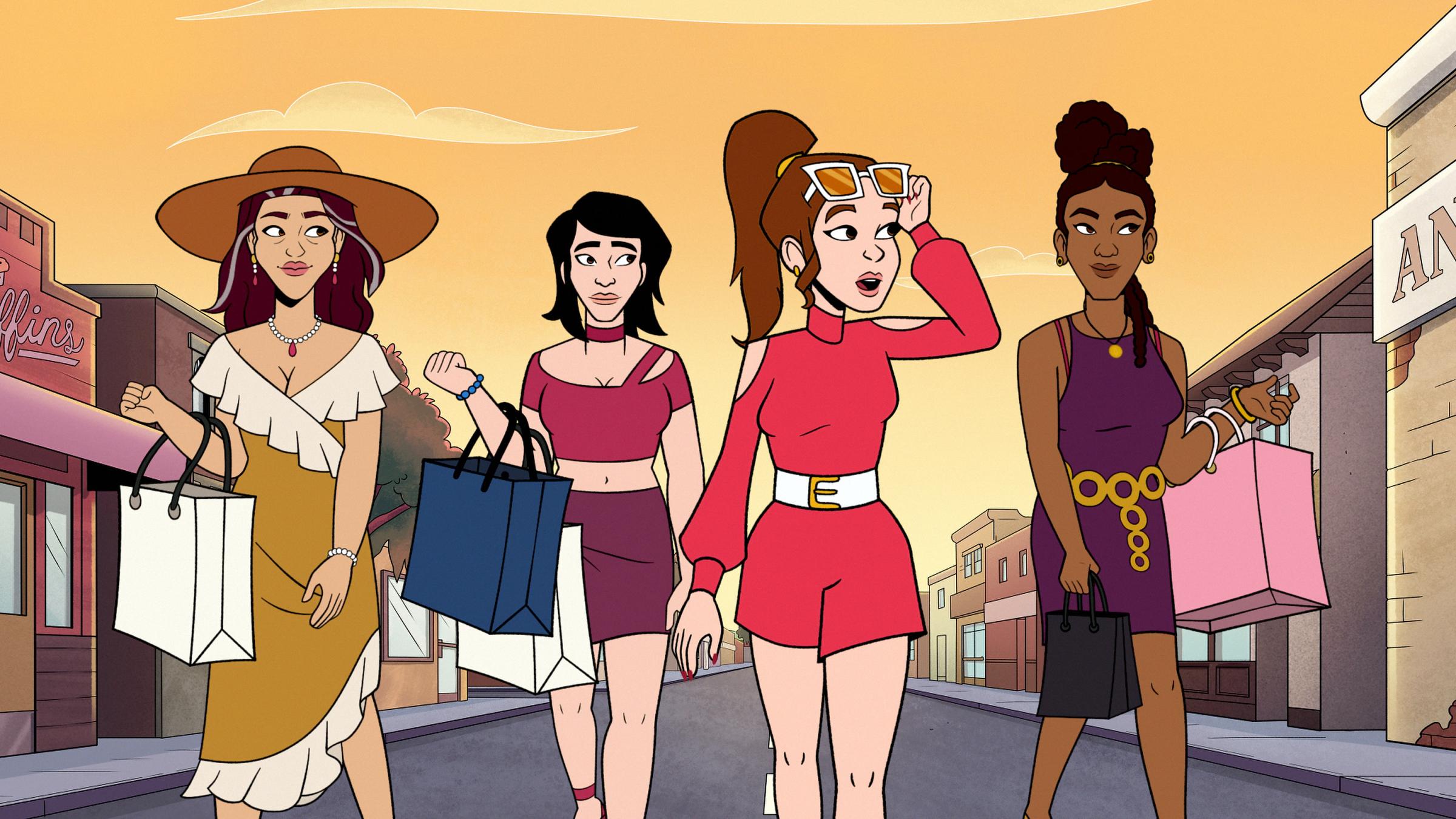
Adult animation is in a curious place these days, thriving and disappointing at the same time. The Simpsons is TV’s longest-running sitcom, but it will never again be the cultural phenomenon it was 30 years ago. Rick and Morty actually is a cultural phenomenon, but one of its creators was fired this past spring following an arrest on domestic violence charges (which were later dismissed). The genre exploded during lockdown, as a practical solution to production constraints, yielding franchise extensions (Star Trek: Lower Decks, a second Beavis and Butt-Head revival) as well as new stories like Amazon’s inane hypebeast comedy Fairfax and Netflix’s middling Chicago Party Aunt. The trend reached a nadir with Mindy Kaling’s exhaustingly meta Velma, on Max. Was anyone really clamoring for a revisionist Scooby-Doo?
Industry-wide obsession with sucking all joy out of nostalgic IP aside, what’s frustrating is how similar so many of these shows can be. Family Guy, American Dad!, and Bob’s Burgers have all run for over a decade with variations on The Simpsons’ eccentric-nuclear-family formula. King of the Hill is getting a Hulu revival, as newer series like The Great North and Central Park riff on the same premise. It’s baffling, given that the medium allows for virtually infinite conceptual freedom, but genuinely original cartoons for adults remain rare. Which is just one of so many reasons why the exuberantly weird new animated comedy Praise Petey is such a delight.

Premiering July 21 on Freeform and arriving on Hulu the next day, Praise Petey comes from the mind of Anna Drezen, the former SNL head writer known for slyly surreal showbiz sendups like “Nephew Pageant” and Kate McKinnon’s unforgettable character Debette Goldry. Schitt’s Creek alum Annie Murphy riffs on her breakthrough fish-out-of-water role as the voice of Petra “Petey” St. Barts, a vivacious young New Yorker who loses her fiancé (he’s a literal slab of lumber, by the way), her best friend, her home, and her job as Senior Assistant/Editorial Assistant at a fashion magazine in the same awful day. Thankfully, her rich, distant mother, Christine Baranski’s spectacularly named White St. Barts, has just informed Petey that she has a father. And he recently died. Also, as he explains in a VHS tape, she’s just inherited the small, Southern town he owns. It’s called New Utopia, which sounds like a cult because it is a cult.
But Petey doesn’t know that yet. “Taxi to the South!” she chirps as her apartment burns, ready to start over. The kind folks of New Utopia hail her arrival; she is, after all, the new overlord whose reign their old overlord (Stephen Root) prophesied. Drezen quickly establishes a versatile cast of characters, from the Leader’s officious girl Friday (Amy Hill’s Mae Mae) to his friendly bevy of widows to an assortment of true oddballs. (Petey awakens one morning to find a self-identified “human Shih Tzu” warming her feet.) She even gets a confidant in Eliza (Kiersey Clemons), the proprietor of a bar called the Filthy Pecker, who seems remarkably normal for a New Utopian. The only person who doesn’t jump on the welcome wagon is local hunk—and Petey’s inevitable love interest—Bandit (John Cho), who hates what her father did to his town.

He doesn’t believe her when she insists that she has no intention of carrying on the Leader’s perverse, megalomaniacal legacy, whose cultiness Petey can no longer deny after she accidentally demands a human sacrifice. Donning a Midsommar-esque flower gown for an initiation rite and declining to adopt her dad’s morning routine of “a heavy breakfast and a light orgy,” she makes it her mission to “de-weirdify” New Utopia. It’s a bigger task than she anticipates. Setting her followers free only makes them miserable. “In my cult, we think for ourselves!” isn’t exactly a winning slogan among people who’d rather commit ritual murder than make a choice.
Instead of emulating the Leader, Petey fumbles her way to becoming a leader—which requires quite a bit of personal growth on the part of a protagonist who, back in New York, couldn’t even speak up at an editorial meeting. One of the great pleasures of Praise Petey is Reductress alum Drezen’s keen awareness of the absurdity of setting a female-empowerment narrative within a bloodthirsty cult whose onsite cinema screens a cut of Erin Brockovitch described as “the story of a secretary who stays a secretary.” This is a distinctly post-girlboss comedy, one that acknowledges Petey’s determination to turn New Utopia around as the girl-power trope it is. While she’s too likable to be a joke, the show never stops playing her predicament for laughs. “This is what a feminist dies like!” proclaims the man whose death Petey inadvertently orders.

While so much adult animation caters to millennial men in arrested development, Praise Petey has a refreshingly irreverent female perspective that makes it a smart first foray into the genre for a network that has courted young women with edgy gems like Single Drunk Female and Cruel Summer. It’s clear that Drezen not only understands but treasures both the conventions of cult camp (references to Jonestown, Waco, and Rajneeshpuram abound) and the frothy touchstones of female-oriented entertainment, from Sex and the City to The Bachelor. Petey and Eliza love a reality show called Hot People Over-sharing Their Trauma and Then Kissing. “My mom got really sick,” a bimbo identified as Jerneen confesses to a himbo named Poulton in one cutaway clip. “My dad exploded,” he deadpans. If you’ve ever seen Too Hot to Handle, you know this is only a slight exaggeration of the conversations that take place on real dating shows.
Like Drezen’s best SNL work, and her contributions to offbeat comedies like Girls5Eva and Miracle Workers, Praise Petey isn’t afraid to get weird. That puts it in good company. The best adult animation of the past, overcrowded decade has used the anything-goes medium to inject lightness into dark or awkward premises: a ’90s sitcom actor turned addict who happens to be a horse in BoJack; an abuse-survivor supervillain in Harley Quinn; a gaggle of hormone-crazed middle schoolers in Big Mouth. In this case, the juxtaposition of glamorous, aimless city girl and central-casting patriarchal cult is something completely different—a deranged The Simple Life, updated for an era when everyone knows the real, sad Paris Hilton story. Petey may be the self-described “nepotism baby of a psycho dictator,” but she earns every word of praise.
More Must-Reads from TIME
- Cybersecurity Experts Are Sounding the Alarm on DOGE
- Meet the 2025 Women of the Year
- The Harsh Truth About Disability Inclusion
- Why Do More Young Adults Have Cancer?
- Colman Domingo Leads With Radical Love
- How to Get Better at Doing Things Alone
- Michelle Zauner Stares Down the Darkness
Contact us at letters@time.com